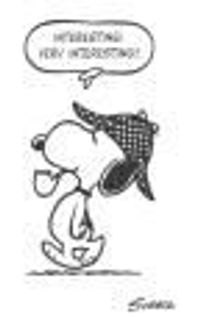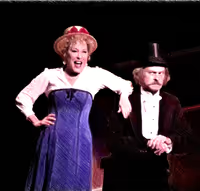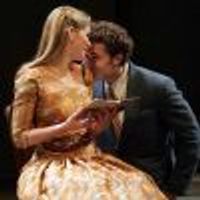"There But For You Go I" from Brigadoon
#1"There But For You Go I" from Brigadoon
Posted: 10/10/11 at 1:26am
I've never seen Brigadoon, nor have I listened to the whole score. I'm getting to it, though.
Anyway, I've been listening to this song, but the phrase "There but for you go I" bothers me. I've only been using English for the past 5 years, so my grasp on meaning is not exactly great. The best approximation of the meaning that I can conjecture is that Tommy would have been like the lonely men if he hadn't met Fiona.
#2"There But For You Go I" from Brigadoon
Posted: 10/10/11 at 2:57am
pinoyidol2006, "There But For You Go I" is my favorite song from "Brigadoon" and, in my view, one of the best songs for a male singer in all of musical theatre.
Yes, the word order of the title, which is sung several times in the song, is a bit awkward. But if you break down the syntax, it makes sense: "There" means some place other than Brigadoon. "But for you" means "If it weren't for you," with you being Fiona with whom Tommy has fallen in love despite the fact his fiancée Jane is waiting for him in New York. "Go I" means "I would leave" or "I will go." When you put this all together, essentially Tommy is saying, "Fiona, if it weren't for you, then I would leave Brigadoon and return to my empty life in New York. But now that I love you, I can't leave you and Brigadoon."
At this point in the show, the world weary Tommy has been reinvigorated by his short visit to the town that appears once every century. Tommy, his best friend Jeff and the men of Brigadoon had just prevented the malcontent Harry Beaton from leaving the town; had Harry Beaton succeeded in departing then Brigadoon would cease to exist. (Side note: Fellow New Yorker and non-Brigadoonian Jeff actually killed Harry Beaton but Tommy does not know this yet.)
The song takes place after Tommy returns with the others from chasing Harry Beaton and he tells Fiona about his feelings for her, which feelings he does not yet trust fully. Fiona declares her love for him and Tommy responds that he thinks he loves her too. So he says, "Think? What good does thinking do? If I thought about it, it wouldn't make any more sense than the miracle. But what I feel? It's something else." Fiona asks him, "What do you feel then, Tommy?" and Tommy launches into "There But For You Go I":
This is hard to say, but as I wandered through the lea,
I felt for just a fleeting moment that
I suddenly was free of being lonely.
Then I closed my eyes and saw the very reason why.
I saw a man with his head bowed low.
His heart had no place to go.
I looked and I thought to myself with a sigh:
There but for you go I.
I saw a man walking by the sea,
Alone with the tide was he.
I looked and I thought as I watched him go by:
There but for you go I.
Lonely men around me, trying not to cry,
Till the day you found me, there among them was I.
I saw a man who had never known a love that was all his own.
I thought as I thanked all the stars in the sky:
There, but for you, go I.
Quite simply, Tommy found in both Brigadoon and Fiona the love and happiness that had theretofore been eluding him. And because of Fiona, he could no longer leave Brigadoon and he would do anything within his power to remain there.
Updated On: 10/10/11 at 02:57 AM
#2"There But For You Go I" from Brigadoon
Posted: 10/10/11 at 3:44am
It is a great song, but actually the title is a variation of the old phrase "there but for the grace of God go I". This is used to mean that the speaker can't look down on another's misfortune because he/she could be in the same situation if not for the grace of God. To rephrase "there, but for... go I means". "I would be in that situation if not for (God, you, etc.)". Tommy is bringing up different lonely men and saying he would be just like those men if not for Fiona.
Gaveston2
Broadway Legend Joined: 6/28/11
#3Archaic Expressions
Posted: 10/10/11 at 4:07am
pinoyidol2006, the posts above mine are correct, but they seem to be avoiding the bottom line: yes, the construction is old-fashioned and it isn't surprising that it sounds odd to your ear.
The grammatical construction of the original phrase ("There but for the grace of God go I.") has been attributed to someone as early as the 16th century, but doesn't appear in print until the early 1800s.
It makes sense in the show because the people of Brigadoon themselves are from an earlier time.
The root expression was still in common use when I was a kid (not too long after the time of the show), so the original audience probably thought little of it.
But one rarely hears it nowadays and if you're not a native speaker, it isn't surprising that it sounds odd to your ear.
It is technically correct, however, both grammatically and in terms of the period in which Brigadoon exists.
#4Archaic Expressions
Posted: 10/10/11 at 5:16amFollowing World War Two, it was a common sight to see veterans who had been grievously wounded - one arm, one leg or one eye - and the standard phrase many former soldiers used was "There, but for the grace of God, go I." So when Lerner and Loewe used the phrase in 1948, it was as common then as "Bummer" would be today.
#5Archaic Expressions
Posted: 10/10/11 at 6:19am
beagle nailed it.
Tommy is saying to Fiona that if she hadn't come into his life, he would be in the same sad situation as the people he's describing.
(Yes, he's substituting Fiona for the common phrase which had "the grace of God" instead ... meaning that if it weren't for the blessings of God, I would be in a similar situation.)
And I agree with jsg03jd ... It's my favorite song from Brigadoon (among so many beautiful gems).
EDIT: Another way to put it is that he's telling her that she's his salvation. By entering his life, she has saved him from becoming like these other men.
blocked: logan2, Diamonds3, Hamilton22
#6Archaic Expressions
Posted: 10/10/11 at 8:45amI love this song and reduces me to tears every time I see the show.
wonkit
Broadway Legend Joined: 9/30/08
#7Archaic Expressions
Posted: 10/10/11 at 10:40amIt is not unusual in poetry (or in drama, where blank verse is used) for word order to be changed to give a heightened sense of the speaker's emotions. I love its use here, because you have Tommy, a modern day regular guy, sounding like an eighteenth-century Romantic poet. Which is appropriate because he is beginning to feel more at home in Brigadoon than in his "real" life back in New York. So, yes, it is definitely a take on "There but for the grace of God go I" but it is also dramatically a bit of a foreshadowing of Tommy's dilemma. And one of my favorite songs, too.
#8Archaic Expressions
Posted: 10/10/11 at 11:31am
Maybe I'm just a total sap and a hopeless romantic, but this show and anything surrounding it makes me all teary. Even just reading jsg03jd's plot description made me want to applaud and cheer Tommy and Fiona.
Le siiigh.
nomdeplume
Broadway Legend Joined: 6/20/05
#9Archaic Expressions
Posted: 10/10/11 at 3:41pm
Beagle's correct. It's not so much an archaic expression as a religious one, "There, but for the grace of God, go I."
While others may have varied interpretations, I've always understood it to mean that If you see a person who is poor, deformed, maimed or has some other terrible problem you should not think yourself better than them but realize that that could be you but for God's grace which has given you an easier existence for the time being. And that you should therefore behave with humility and treat that person well and be thankful for the grace shown you, for God could choose to change your life in an instant.
By metaphor here, love is being equated with God's grace. Which if you think of the text of Corinthians to the effect that God is love and dwells within us, would be part of a definition of what "God" is.
I like Brigadoon!
Updated On: 10/10/11 at 03:41 PM
Gaveston2
Broadway Legend Joined: 6/28/11
#10Archaic Expressions
Posted: 10/10/11 at 6:09pm
Um, guys, the original poster understood what the phrase means. He explains it correctly in his post. He is a non-native speaker and was asking about grammatical construction that struck him as odd.
And of course the construction is archaic. It isn't magical religious incantation, no more than the St. James' Bible. The phrase dates from a period when such formal constructions were considered eloquent rather than awkward. And it so happens that the root phrase ("There but for the grace of God go I.") outlived the grammatical style. (As I said above, it was still a common proverb when I was a kid in the 1960s.)
Nowadays the same phrase would be considered bad lyric writing, because we no longer find it acceptable to invert word order just to make a line rhyme. UNLESS you justify it on the ground that the construction is no more archaic than the setting of the scene in Brigadoon.
#11Archaic Expressions
Posted: 10/10/11 at 6:24pmI think Tommy is a huge Star Wars fan, and he just decided to talk like Yoda.
blocked: logan2, Diamonds3, Hamilton22
#12Archaic Expressions
Posted: 10/10/11 at 9:16pm
I'm aware of the expression "There but for the grace of God go I" and I just tried to give the OP more context because the OP said they weren't done listening to the score. The OP also didn't indicate whether they knew the plot of "Brigadoon."
Anyway, there was a band called Machine (with August Darnell) that had a 1979 hit entitled "There But for the Grace of God Go I." The first time I heard it was from, of all places, the soundtrack for the film "Kiss Me Guido," which was released in 1997.
#13Archaic Expressions
Posted: 10/11/11 at 1:17amThank you so much for all your replies! I just adore that song so much!!!
nomdeplume
Broadway Legend Joined: 6/20/05
#14Archaic Expressions
Posted: 10/11/11 at 2:19amI enjoy Meg's song "The Love of My Life" -- funny & fun.
#15Archaic Expressions
Posted: 10/11/11 at 5:16am
All the songs in "Brigadoon" are great. "There But For You Go I" is my favorite but the duets are also gorgeous: "The Heather on the Hill," "Almost Like Being in Love" and "From This Day On."
I really believe "From This Day On" is one of the most underrated numbers in musical theatre. It's quite powerful both as the "break up/farewell" song for Tommy and Fiona and also their "reunion" song when Tommy's mind was wandering back to Brigadoon as he ignored Jane's babbling toward the end of Act II.
#16Archaic Expressions
Posted: 10/11/11 at 6:32am
I may get shot for saying this from some, but I think "From This Day On" is as powerful melodically as anything Bernstein wrote in West Side Story.
Shirley Jones & Jack Cassidy "From This Day On" (Jack's vibrato annoys me a lot, but it's still a nice rendition of the song. Shirley sounds great.):
http://www.youtube.com/watch?v=y6yq8JBRakI
Adam Lambert singing "Come To Me, Bend To Me" (surprisingly well):
http://www.youtube.com/watch?v=DJYyqzUr6jU
Rebecca Luker singing "Waitin' For My Dearie"
http://www.youtube.com/watch?v=yACnwjQALro&feature=related
I have to say, when this show is done right, with singing actors who "believe" in the magic of the story, it can't get much better than this on the musical stage.
blocked: logan2, Diamonds3, Hamilton22
#17Brigadoon
Posted: 10/11/11 at 2:49pm
I agree, best12bars. From what I've seen, Brigadoon is one of those shows that is positively wonderful when done well, but it's also a show that's easy to screw up. If it's not done right, it can be excruciating to watch.
I'm glad you included the clip of Rebecca Luker. That album (the studio recording with Luker as Fiona and Brent Barrett as Tommy, with Judy Kaye as Meg) is my favorite recording of this show. It really captures the spirit of the show, and the cast is wonderful.
Gaveston2
Broadway Legend Joined: 6/28/11
#18Brigadoon
Posted: 10/11/11 at 3:57pm
^^^^^
I agree about that recording.
Also, Reprise LA did it five or six years ago with Marin Mazzie and Jason Danieley as the leads. Sean McDermott sang Charlie Dalrymple. The singing was glorious.
That being said, for me the book plays rather stiffly, almost as if we are watching a Christmas pageant or hearing Handel's "Messiah."
Not that I'm complaining, mind you, because the score really is magnificent. But I don't feel any true dramatic conflict between the characters or much suspense in the plot. Events simply unfold as they must: wedding, chase, funeral, good-byes, return to Brigadoon.
Updated On: 10/11/11 at 03:57 PM
#19Brigadoon
Posted: 10/12/11 at 4:34am
"I may get shot for saying this from some, but I think "From This Day On" is as powerful melodically as anything Bernstein wrote in West Side Story."
No shots from me because I couldn't agree more. "From This Day On" has such a gorgeous melodic line and truly heartbreaking lyrics. The song soars when Fiona sings her concluding line and when later Tommy and Fiona reprise it as a duet. It's a perfect song for a baritone and a soprano in both musical theatre and opera companies.
I too love the 1993 studio cast recording of "Brigadoon." It is so well-done in terms of production, casting of performers, selection of dialog for inclusion in the recording et al. I cannot say enough good things about it.
Videos








